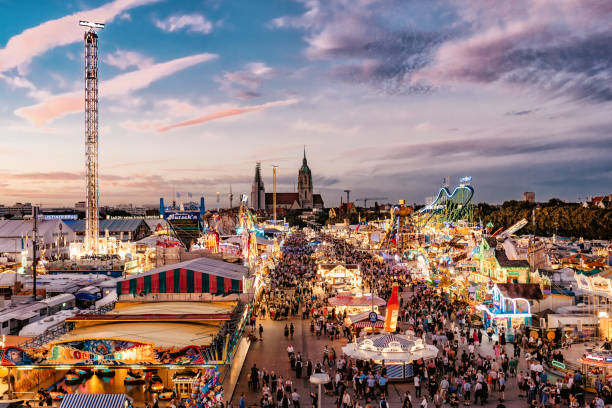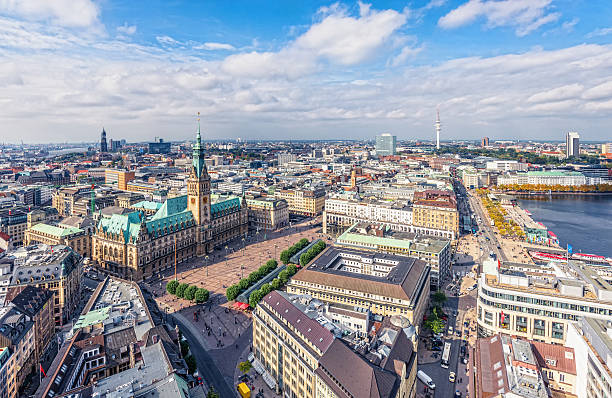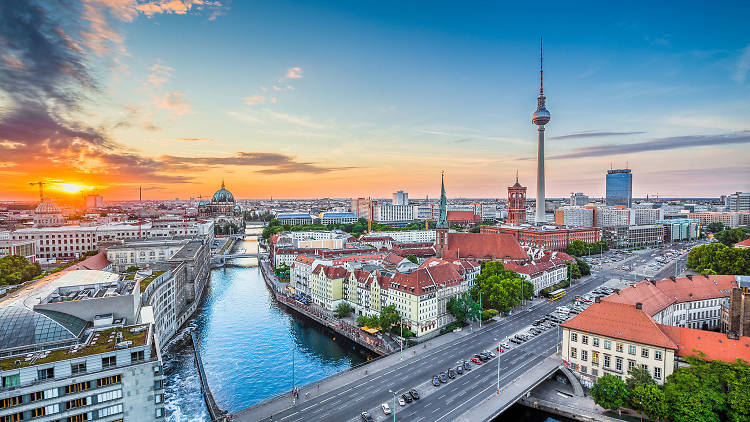Germany, a land steeped in history and rich in culture, features more than 40 UNESCO World Heritage sites. From the enchanting castles of Bavaria to the vibrant nightlife of Berlin and the stunning beauty of the Rhine Valley, Germany never fails to mesmerize its visitors. This country effortlessly blends age-old traditions with modern innovation, with every corner revealing a unique story.
Embarking on a journey to Germany is like stepping into a living kaleidoscope of history, culture, and nature, and a well-planned trip can further enrich this experience. With the right Tourist Map of Germany, you can carve your own route through this intriguing nation, uncovering hidden treasures and immersing in singular experiences at your leisure. This map serves as your key to unlocking the countless marvels that Germany has to offer and your trusted aide on an unforgettable adventure.
What to See and Do in Germany
From the dynamic urban vibes of Hamburg to the tranquil vineyards of Mosel, Germany is a symphony of experiences waiting to be unearthed. Every city, region, and hidden nook of this country spins a different tale, beckoning you to delve deeper into its rich tapestry of history, culture, and natural beauty.
Urban Wonders: Hamburg and Dresden
Perched on the banks of the Elbe River, Hamburg thrives with maritime charm, while Dresden, the 'Florence of the North', exhibits a remarkable collection of Baroque architecture. In Hamburg, the Speicherstadt – the world's largest warehouse district – is a must-see. Its Gothic red-brick edifices, now housing museums and exhibits, stand as a testament to the city's historic trading prowess. On the other hand, Dresden offers a captivating time travel with its meticulously restored palaces and churches.
Natural Beauty: The Black Forest and Saxon Switzerland National Park
Plunge into the captivating wilderness of Germany's great outdoors. Venture into the Black Forest, where dense forests open up to glimmering lakes and quaint villages. The region's picturesque hiking trails and rejuvenating thermal baths make it a sanctuary for nature enthusiasts and wellness seekers. Further east, the rugged landscapes of Saxon Switzerland National Park will leave you awe-struck. Its towering sandstone formations juxtapose beautifully with the serene Elbe River, creating an awe-inspiring spectacle.
Historical Jewels: Heidelberg and Trier
Germany's historical jewels are its cities that time seems to have bypassed. Heidelberg, with its romantic castle ruins and Germany's oldest university, exudes an irresistible old-world charm. Trier, the country's oldest city, whisks you back to Roman times with its well-preserved amphitheater and the imposing Porta Nigra, the largest Roman city gate north of the Alps.
Gastronomic Delights: Franconian Wine Country and Cologne's Beer Halls
Germany's culinary landscape is as varied as its topography. From the vine-clad hills of Franconia to the merry beer halls of Cologne, the country presents a delightful feast for the senses. The Franconian wine region, known for its distinctive Bocksbeutel wine bottles, invites you to sip and savor its excellent whites. In Cologne, join the locals in a traditional Brauhaus to experience the conviviality of a Kölsch beer session.
Art and Culture: Munich's Museums and Leipzig's Music Heritage
Germany's vibrant cultural scene is a treasure trove for art lovers and music enthusiasts. Munich's museum quarter, featuring institutions like the Pinakothek der Moderne and the Brandhorst Museum, displays an astounding variety of art from classic paintings to contemporary installations. Leipzig, the city of music, resonates with the melodies of its illustrious past. Experience a concert at the Gewandhaus or trace the steps of renowned composers like Bach and Mendelssohn at the city's numerous historic spots.

Booking.com
Practical Information for Germany
Transportation and Mobility
Germany boasts a highly developed and efficient public transportation network, which includes buses, trams, U-Bahn (underground), S-Bahn (suburban train), and regional trains. The Deutsche Bahn (DB) oversees most of the train services and provides high-speed connections between major cities. For instance, a journey from Berlin to Munich takes about 4 hours on the ICE (InterCity Express) train.
For inner-city travel, most cities have extensive transport networks. Consider getting a day pass or a city card for unlimited travel and other benefits such as free entry to specific attractions.
For those who prefer driving, Germany's autobahn system is renowned for its sections without speed limits. However, it's important to note that inner-city areas often have strict parking regulations.
Schedules and Prices
Train and bus schedules differ based on the route and day of the week. Generally, they operate more frequently during weekdays and peak hours. Always check the DB website or local transport websites for accurate schedules.
As for prices, a single inner-city public transport ticket typically costs around €2.80. Day passes can range from €7 to €10, while city cards can cost between €20 and €40, depending on the city and amenities included.
A cross-country ICE train ticket can cost from €40 to €120, depending on the distance and booking time – early booking usually offers substantial discounts.
Safety Tips
Germany is generally a safe destination for travelers, but as with any location, basic precautions are important. Keep an eye on your personal belongings in crowded areas and refrain from walking alone late at night in unfamiliar areas. It's also advisable to have a copy of your passport and important documents in case of loss or theft.
Note that it's illegal to run out of fuel on the autobahn, so always ensure your tank is sufficiently filled, particularly before long journeys.
Practical Recommendations
The best time to visit Germany typically depends on your interests. For warmer weather and outdoor activities, plan your visit between May and September. However, if you're keen on experiencing Germany’s famous Christmas markets, schedule your trip in late November or December.
Germany uses the Euro (€), and cash is still widely used, especially in smaller towns and restaurants. However, most places accept credit and debit cards. ATMs are readily available across the country.
Last but not least, remember that Germany has strict recycling regulations. Ensure to sort your waste accordingly and return bottles to supermarkets for a deposit refund.

Frequently Asked Questions
1. Can I travel with my pet to Germany?
Yes, Germany is indeed pet-friendly, but there are certain regulations to be aware of. Dogs, cats, and ferrets must be microchipped and vaccinated against rabies. A pet passport is also necessary. However, certain breeds of dogs are banned in some German states. It's always recommended to check the specific rules before traveling.
2. How can I access healthcare services in Germany as a tourist?
Germany offers top-notch healthcare services, even for travelers. European Health Insurance Card (EHIC) holders can access healthcare at the same conditions as German residents. For non-EU tourists, travel insurance covering health services is strongly recommended. Pharmacies, locally known as Apotheken, are widely available for minor health issues.
3. Is it common to tip in Germany?
Tipping is customary in Germany, but it's not as rigid as in other countries. Usually, a tip of 5-10% is expected in restaurants, depending on the quality of the service. It's also common to round up the bill in cafes and taxis. However, tipping is not obligatory and should reflect your satisfaction with the service.
4. Are there any particular rules I should be aware of when visiting religious sites in Germany?
When visiting religious sites in Germany, respect and decorum are paramount. Modest dress is expected, especially in Catholic churches. Speaking in hushed tones and turning off mobile phones are also needed. In some churches, you may see a small fee for photography or a voluntary donation box near the entrance.
5. What is the etiquette for using public baths and saunas in Germany?
Public baths and saunas are part of German culture, but they follow certain rules. Most notably, nudity is common in many saunas, and swimsuits may even be prohibited in certain areas. Silence is also typically expected to maintain a relaxing atmosphere. Always check the specific rules of the establishment before visiting.
6. Is it easy to find vegetarian or vegan food in Germany?
Yes, vegetarian and vegan options are increasingly common in Germany. Many restaurants offer vegetarian dishes, and cities like Berlin and Hamburg boast a thriving vegan scene. Additionally, supermarkets carry a wide range of plant-based products. Just look for the words "vegetarisch" (vegetarian) or "vegan" (vegan).
For more detailed information and guides on other German cities, don't forget to check out our Tourist Map of Brandenburg.

